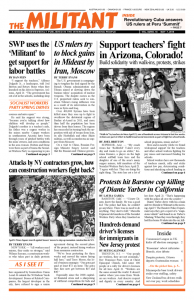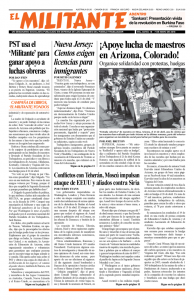Although the ostensible theme of the April 13-15 “VIII Summit of the Americas” in Lima, Peru, was to advance “the fight against corruption,” Washington and its allies used the meeting to push their campaign to bring down the government of Nicolás Maduro in Venezuela.
The U.S. rulers got Peruvian President Pedro Pablo Kuczynski to revoke Maduro’s invitation to the meeting, because the Venezuelan government had the temerity to refuse to call off elections scheduled there for May 20 when Washington said they should do so. Claiming the right to intervene in Venezuela’s internal affairs, Washington charges the elections are rigged.
But despite a big buildup, the summit ended with barely a whimper. Less than half the 34 invited heads of state attended. Instead, most sent their foreign ministers, vice presidents or other officials. President Donald Trump — saying he was too busy deciding what kind of military strike to launch against Syria — sent Vice President Mike Pence.
The corruption theme turned out to be ironic in more ways than one. Just three weeks before the summit’s opening, Kuczynski had to resign to avoid impeachment over charges he had taken bribes. Martín Vizcarra was named Peru’s president in his stead.
The Organization of American States, which sponsors the summit, has a long history as a tool of U.S. colonial domination in the hemisphere. At U.S. insistence it expelled Cuba in 1962, to punish working people there for overthrowing the dictatorship of Fulgencio Batista. In 1976 it demonstratively supported Chilean dictator Gen. Augusto Pinochet by holding a meeting in Chile.
In 2009 Cuba rejoined, as Washington had to bow to growing pressure from a number of governments in the region that saw Cuba’s continuing exclusion as an affront to their own independence and sovereignty. Foreign Minister Bruno Rodríguez represented Cuba at the summit.
U.S. imperialist hypocrisy
Pence used his plenary speech to attack revolutionary Cuba and the Venezuelan government. He called the Cuban government “a tired communist regime” with a “failed ideology,” charged it was “aiding and abetting the corrupt dictatorship in Venezuela.”
He blamed the unfolding economic crisis in Venezuela entirely on Maduro and his government, which face deep economic sanctions from Washington, and said, “The United States of America will not stand idly by as Venezuela crumbles.”
Despite the heated rhetoric, and Washington’s decision to slash in half the number of personnel at the U.S. Embassy in Havana, the Trump administration has continued to hold regular joint meetings with Cuba on security, migration and other issues. These meetings began after the two governments re-established diplomatic relations during the last year of the Obama administration.
And while Washington rails at Maduro, it has no intention of invading Venezuela. The U.S. rulers believe the economic crisis there will hasten Maduro’s fall.
Cuban leader Rodríguez answered Pence’s hypocritical remarks and denounced the exclusion of Venezuela’s sovereign government. “The moral vacuum of the U.S. government can’t be, is not a reference point for Latin America and the Caribbean,” Rodríguez said. “All of the despotic governments of the region, all without exception, have been imposed by or received the support of the U.S. government, including the most cruel military dictatorships.” Among those Rodríguez highlighted was the Pinochet dictatorship in Chile, installed in a U.S.-backed coup that killed thousands in 1973.
Rodríguez pointed out that April was the 57th anniversary of the Bay of Pigs, when U.S.-trained mercenaries attempted to invade and overthrow the Cuban Revolution, but were utterly defeated in only three days by a mobilization of the country’s combatants and workers and peasants.
Capitalism breeds corruption
Bolivian President Evo Morales also exposed the U.S. rulers and their backers. “We should discuss the structures of corruption, what feeds them, who tolerates and promotes them,” he said. “The real challenge is to dismantle the system in which corruption prospers, capitalism.”
“Just like in the past when they used the pretext of the fight against communism, the fight against drug trafficking or the fight against terrorism, today they try to use the false struggle against corruption to overthrow legitimate democratic governments,” Morales said, “and to criminalize political projects of change.”
U.S. imperialism is the biggest “threat to democracy, peace and freedom,” he said.
The sharp debates over the exclusion of Venezuela, and the U.S. campaign to vilify Venezuela and the Cuban Revolution continued at a series of parallel meetings, including an official “civil society” forum and an unofficial “People’s summit,” attended by left parties and organizations.
Delegates from a number of Cuban mass organizations, including from the Federation of University Students, protested their exclusion from some of the official events, while counterrevolutionary Cubans financed by Washington were invited in.
Because the summit operates by consensus, Washington was unable to get any anti-Venezuela or anti-Cuba planks included in the final declaration.
Instead, Washington engineered a statement that was released during the summit by the Group of Lima — 15 compliant Latin American governments that align themselves with Washington — that called for turning up economic and financial pressure against Venezuela.

